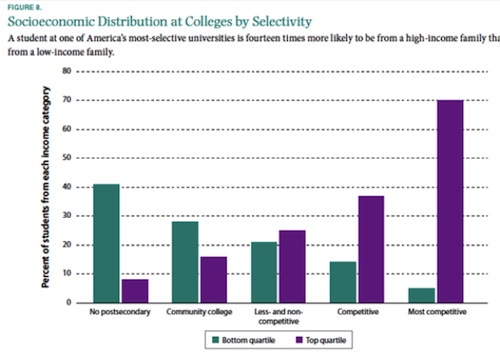Check out that chart above. Basically, at a highly-selective school, a student is 14 times more likely to be from an affluent family than a poor family. That’s from new research via Brookings, which also notes this:
There are number of factors driving these diverging trends, but part of the problem is that there just aren’t enough good colleges out there for low-income students. The number of high-quality institutions has remained roughly constant over time, despite the growth in college attendance. Funding for community colleges – the first stop for most low-income college-bound students – has not grown as quickly as enrollments, leading to overburdened counselors, long waitlists for classes, and delayed graduation. As a result, many low-income students have turned to for-profit colleges, where they are more likely to get deeply in debt. Tackling these supply-side constraints would be one important step towards closing the widening rich-poor gaps in postsecondary education.
So let’s summarize this: if you’re wealthy, you give money back to your undergrad/grad school in the efforts of (personally) getting your name on something and/or getting your nephew/child in there, but you rationalize it to yourself as (broader society) this is going to help some young buck on the way to his first 500K. In reality, it’s helping some young buck whose dad makes 500K every 1.115 years. The rich get richer, the poor fall behind, and so goes the loop of inequality, driven by the steam engine of higher education — that vessel that’s supposed to equalize the playing field. Look, what I just said is a broad generalization and it doesn’t always work that way, but the sheet fact that it works that way sometimes — or even close to 50 percent of the time — is a bad idea. Maybe Southern New Hampshire University really does have it right. Or maybe MOOCs do. Regardless, we need a solution to this cycle.
In the meantime, if you want your money to help “upstart cases” or “bootstrap examples” or whatever you want to define it as, look for an organization that actually helps those segments — which higher education, broadly, isn’t doing. A possible example might be Year Up.

